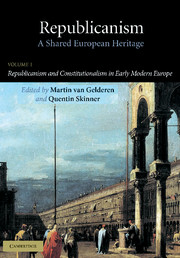Book contents
- Frontmatter
- Contents of Volume I
- Contents of Volume II
- Acknowledgments
- Introduction
- Part I The Rejection of Monarchy
- Part II The Republican Citizen
- 5 Citizenship and Republicanism in Elizabethan England
- 6 Republican Citizenship and Civic Humanism in the Burgundian-Habsburg Netherlands (1477–1566)
- 7 Civic Humanism and Republican Citizenship in Early Modern Germany
- 8 Civic Humanism and Republican Citizenship in the Polish Renaissance
- Part III The Republican Constitution
- Bibliography
- Contributors
- Index of Names of Persons
- Index of Subjects
5 - Citizenship and Republicanism in Elizabethan England
Published online by Cambridge University Press: 15 December 2009
- Frontmatter
- Contents of Volume I
- Contents of Volume II
- Acknowledgments
- Introduction
- Part I The Rejection of Monarchy
- Part II The Republican Citizen
- 5 Citizenship and Republicanism in Elizabethan England
- 6 Republican Citizenship and Civic Humanism in the Burgundian-Habsburg Netherlands (1477–1566)
- 7 Civic Humanism and Republican Citizenship in Early Modern Germany
- 8 Civic Humanism and Republican Citizenship in the Polish Renaissance
- Part III The Republican Constitution
- Bibliography
- Contributors
- Index of Names of Persons
- Index of Subjects
Summary
I humbly pray you to believe that I aspire to the conscience and commendation first of bonus civis … and next of bonus vir.
Francis Bacon to the earl of Essex, 20 July 1600England was a monarchy in the sixteenth century. It consisted of a monarch and her/his subjects, organised in a strict hierarchy. The monarch was expected to undertake the Herculean task of looking after the well-being of the whole community. In his well-known definition of De republica Anglorum Thomas Smith noted that ‘the prince is the life, the head, and the authoritie of all thinges that be doone in the realme of England’. Charles Merbury agreed: the king had ‘power full and perpetuall ouer all his subiectes in generall, and ouer euery one in particular’ (Smith 1982: 88; Merbury 1581: 41). In striking contrast to the monarch, the subject was expected to be obedient and mind his/her own business. Whereas the queen, one author argued in 1601, was ‘so absolute a Soueraigne, and so soueraigne an Empresse’ that she ‘truly meriteth the due title of Cesar’, her counsellors' principal duty was ‘not onely to obey, but most principally draw others to obedience to our Caesar’ (N[esbit] 1601: 4, sig. a5v–6r).
- Type
- Chapter
- Information
- RepublicanismA Shared European Heritage, pp. 85 - 106Publisher: Cambridge University PressPrint publication year: 2002
- 12
- Cited by



